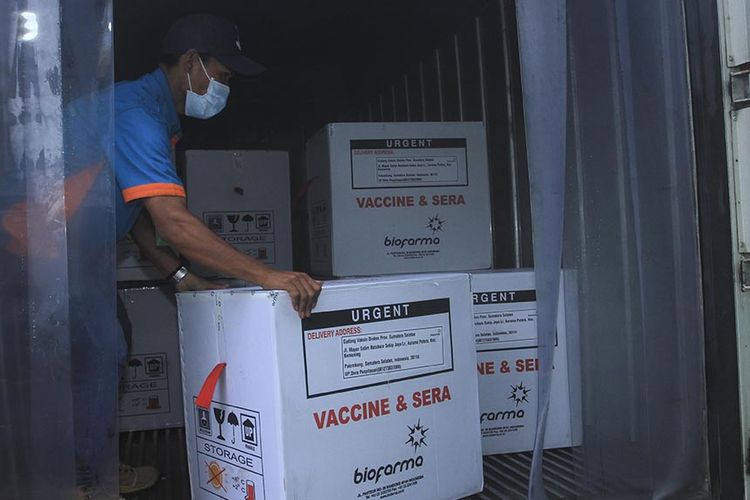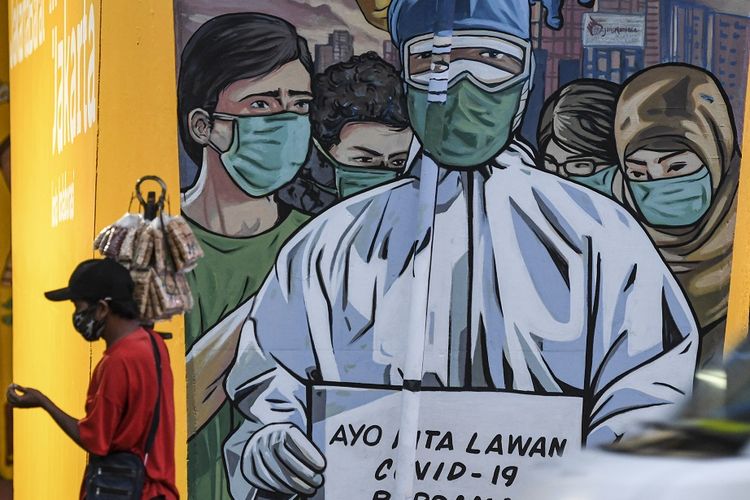Indonesia Highlights: Indonesian JI Militants Respected by Terrorists in Syrian Civil War | Indonesia Distributes First Covid-19 Vaccines Nationwide | Indonesian Public Upbeat About 2021

JAKARTA, KOMPAS.com – Indonesia is set to carry out chemical castration as a penalty for sex offenders following a string of cases involving women and children in 2020.
The country will be the eighth in the world to have the punishment in its book, following the likes of Great Britain, the Ukraine, and a number of US states.
The Indonesian National Police is starting to disclose the role of Indonesian Jemaah Islamiyah militants in the Syrian Civil War. Investigators said their influence is out of proportion to their actual numbers.
Indonesian pharmaceutical company Bio Farma has distributed the preliminary 700 thousand vaccines to provinces throughout the country. However, West Java and West Sulawesi are not on this list, in an inexplicably glaring omission.
And a survey conducted by Kompas has shown that the Indonesian public is looking forward to 2021, after going through a hard year in 2020 that was dominated by Covid-19 and the challenges stemming from the pandemic. Read on for more on these stories:
 Young Jemaah Islamiyah (JI) militants training in ambushes, kidnapping as well as bomb making at a villa in Semarang, Central Java
Young Jemaah Islamiyah (JI) militants training in ambushes, kidnapping as well as bomb making at a villa in Semarang, Central Java Indonesian JI Militants Respected by Terrorists in Syrian Civil War
The Indonesian National Police has started to disclose the role played by Indonesian Jemaah Islamiyah [JI] militants during the Syrian Civil War.
Indonesian National Police spokesman Inspector General Argo Yuwono announced the militants were “fully trained in in management and IT, while others were skilled in medicine, linguistics and self-defense,” he said on Monday, January 4.
Argo added that the information was based on the confessions of Para Wijayanto, a senior JI operative or Amir who was captured in the city of Bekasi, West Java province, in 2019.
“The militants also learned additional military skills such as bombmaking, driving tanks and operating heavy weapons as they served in the frontlines and guarded Syria’s borders,” he added.
“Their training, as well as their skillsets made them respected by the various militant factions. They also trained ISIS, Jabbah Nusrah, the Ahror [Syrian Brigade], the Free Syrian Army, as well as Tahrir al Sham in self-defense.”
Argo disclosed that JI has sent seven militants to Syria between 2013 to 2018. “JI spent Rp. 300 million [$21,532.12] to send each volunteer to Syria,” he noted
 South Sumatra Provinces Health Service receives 30 thousand vials of the Covid-19 vaccine manufactured by Sinovac from Bio Farma on Monday, (4/1/2021)
South Sumatra Provinces Health Service receives 30 thousand vials of the Covid-19 vaccine manufactured by Sinovac from Bio Farma on Monday, (4/1/2021)Indonesia Distributes First Covid-19 Vaccines Nationwide
State owned Indonesian pharmaceutical company Bio Farma has started to distribute the first Covid-19 vaccines from its Chinese counterpart Sinovac, which arrived in Indonesia at the end of 2020.
Bio Farma Head of Corporate Communications Iwan Setiawan confirmed that the vaccines came from the 1.2 million doses that arrived in Indonesia in December 7, 2020.
“[Bio Farma] distributed more than 700 thousand ready-to-use vials of the vaccine on January 3 and 4,” he said on Monday, January 4. “401,240 vials were sent to 14 provinces on January 3, while 313 thousand vials of were distributed to 18 provinces.”
The majority of the vaccines on the first day of shipments were sent to East Java with 77,760 vials, followed by Central Java with 62.560 vials and Bali with 31.000 vials.
Bio Farma earmarked most of the vaccines on the second day of shipments on January 4, 2021 to Jakarta, which received 39.200 vials. South Sulawesi received the second highest supply with 30.000 vials, and Yogyakarta is third with 26.800 vials.
Iwan added that the vaccines’ use is “pending the Emergency Use Authorization from the Food and Drug Agency [BPOM].”
However, West Java and West Sulawesi have yet to receive the vaccines. Bio Farma has yet to disclose the reasons for the omission.
 A vendor in Jakarta walks past a mural calling on the public to combat the COVID-19 di Jakarta, Sunday, (29/11/2020). ANTARA FOTO/M Risyal Hidayat/aww.
A vendor in Jakarta walks past a mural calling on the public to combat the COVID-19 di Jakarta, Sunday, (29/11/2020). ANTARA FOTO/M Risyal Hidayat/aww.Indonesian Public Upbeat About 2021
A survey conducted by Kompas revealed that a majority of Indonesians are ready to start anew in 2021, following a tough past year dominated by the Covid-19 pandemic and its fallout.
“85.5 percent of respondents are confident that Indonesia can bounce back in 2021. 78.9 percent of them are confident that Indonesia’s social, economic and political conditions will improve next year,” said Kompas of the survey. The pandemic still loomed large in the participants’ mind.
But they noted that a curative approach to overcome the effects of the Covid-19 pandemic is still needed, as “31.2 percent of participants believe that the central and local government can improve health services.”
Kompas conducted the survey between December 21 to 23 2020. 519 respondents from all walks of life participated in the questionnaire, which was conducted in Indonesia’s 34 provinces. The survey has a 95 percent accuracy rate with 4.30 percent margin of error.
Simak breaking news dan berita pilihan kami langsung di ponselmu. Pilih saluran andalanmu akses berita Kompas.com WhatsApp Channel : https://www.whatsapp.com/channel/0029VaFPbedBPzjZrk13HO3D. Pastikan kamu sudah install aplikasi WhatsApp ya.






























